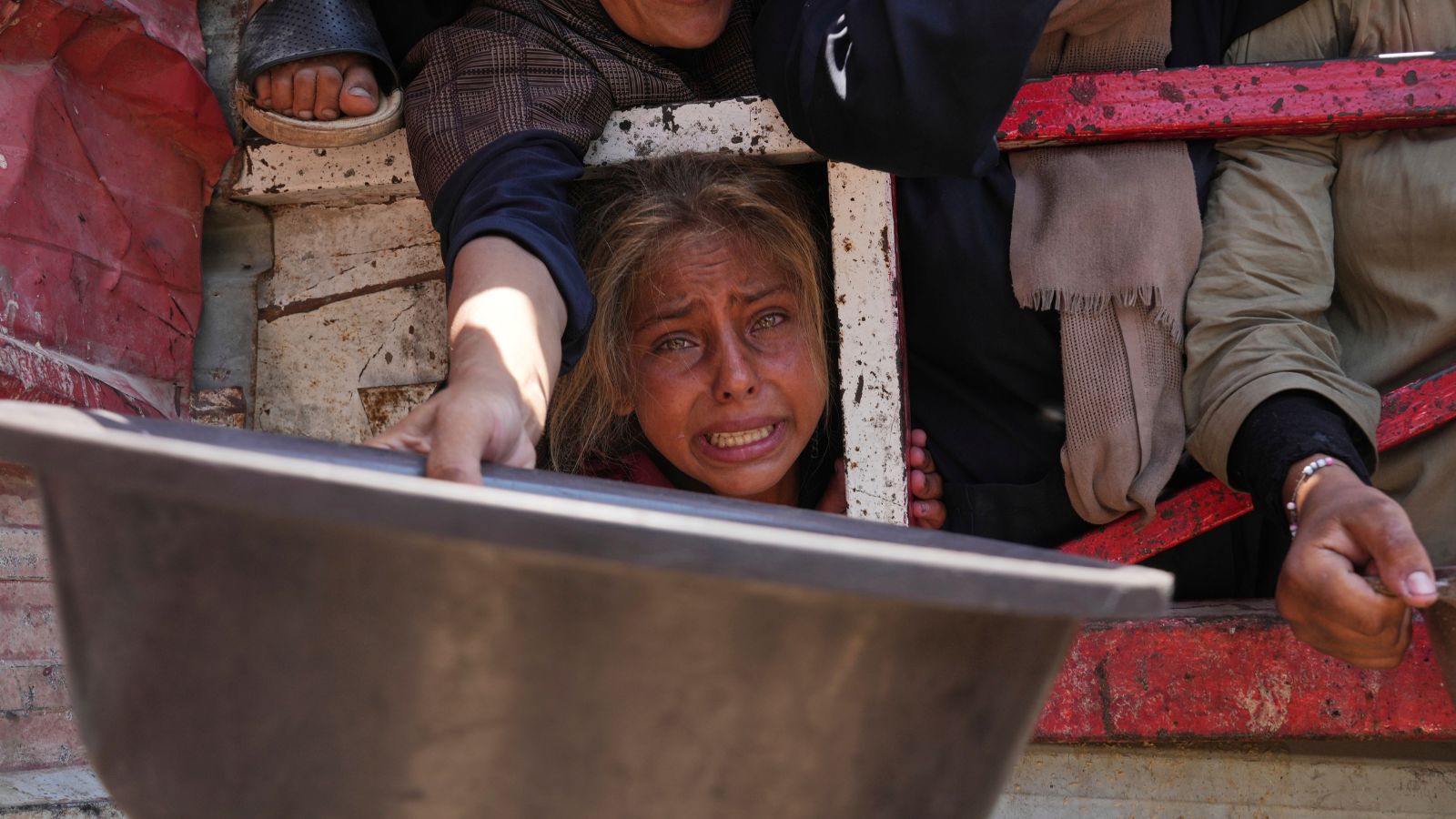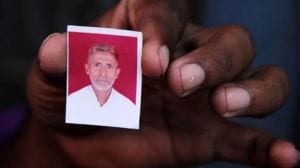Stay updated with the latest - Click here to follow us on Instagram
UN declares full-blown famine in Gaza. What we know so far
The UN-backed food security body said more than 500,000 people in the Strip are facing "starvation, destitution and death", with "catastrophic conditions" projected to expand to Deir al-Balah and Khan Younis next month.
 Palestinians struggle to receive donated food at a community kitchen in Gaza City, northern Gaza Strip (AP Photo/Abdel Kareem Hana)
Palestinians struggle to receive donated food at a community kitchen in Gaza City, northern Gaza Strip (AP Photo/Abdel Kareem Hana)
Famine has now been formally declared in Gaza City and surrounding areas, with UN-backed experts warning that the crisis is “entirely man-made” and could lead to exponentially rising deaths without immediate intervention.
The Integrated Food Security Phase Classification (IPC) on Friday declared that famine is underway in Gaza governorate, home to hundreds of thousands of Palestinians in the north, and warned it is likely to spread to Deir el-Balah in central Gaza and Khan Younis in the south by the end of next month.
- 01
Escalating hunger levels across Gaza
The report officially declares a famine in and around Gaza City, the territory’s largest urban centre, home to an estimated 500,000–800,000 people, many of them displaced and without shelter.
After 22 months of war, over half a million people in Gaza are now in famine conditions (IPC Phase 5), marked by "starvation, destitution and death", the IPC reported. An additional 1.07 million people – or 54% of the population – are in emergency levels (Phase 4), while 396,000 people (20%) remain in crisis (Phase 3).
- 02
Warning of catastrophic escalation
The IPC report says: “This famine is entirely man-made, it can be halted and reversed. The time for debate and hesitation has passed, starvation is present and is rapidly spreading. There should be no doubt in anyone’s mind that an immediate, at-scale response is needed. Any further delay – even by days – will result in a totally unacceptable escalation of famine-related mortality.”
This marks the sharpest deterioration since the IPC partnership – made up of 21 organisations including UN agencies, NGOs, technical bodies and regional groups – began assessing acute food insecurity and malnutrition in Gaza.
It is also the first time a famine has been formally declared in the territory.
- 03
Risk of mass deaths without ceasefire
The report further warns: “If a ceasefire is not implemented to allow humanitarian aid to reach everyone in the Gaza Strip, and if essential food supplies and basic health, nutrition and [sanitation and water] services are not restored immediately, avoidable deaths will increase exponentially.”
The IPC global initiative called the crisis “a race against time,” stressing that “famine must be stopped at all costs.”
It cautioned that acute malnutrition is expected to deteriorate further and “rapidly.”
- 04
Children and mothers at risk
The IPC warned that by June 2026, at least 132,000 children under five could face life-threatening acute malnutrition — double the number estimated in May 2025.
Among them, about 41,000 severe cases are at heightened risk of death.
The report also mentioned that nearly 55,500 malnourished pregnant and breastfeeding women will urgently need nutrition support.
- 05
‘Man-made disaster’
UN Secretary-General Antonio Guterres condemned Gaza’s famine as a “man-made disaster, a moral indictment, and a failure of humanity itself,” stressing that “famine is not only about food; it is the deliberate collapse of the systems needed for human survival,” and warning that “people are starving, children are dying, and those with the duty to act are failing.”
He said Israel, as the occupying power, has “unequivocal obligations” under international law to ensure food and medical supplies reach Gaza, adding: “We cannot allow this situation to continue with impunity. No more excuses. The time for action is not tomorrow – it is now.”
- 06
Rising starvation deaths
Gaza’s health ministry, with figures verified by the World Health Organization, reported a sharp rise in deaths from malnutrition and starvation.
In the 22 months since Hamas’s 7 October attacks, 89 people—mostly children under 18—died from hunger. In just the first 20 days of August, another 133 deaths were recorded, including 25 children.
Israel disputes these figures, attributing fatalities to other medical causes.
- 07
“Urgent, comprehensive and sustained action”
The IPC report also voiced alarm over the ongoing large-scale killing of civilians attempting to access food aid and criticised the poor planning, implementation, and oversight of the American non-profit Gaza Humanitarian Foundation’s privatised food distribution.
It urged “urgent, comprehensive and sustained action to end the swiftly deteriorating and ever-expanding humanitarian catastrophe in the Gaza Strip.”
The IPC noted that Gaza’s food system has effectively collapsed, with nearly 98 per cent of cropland either destroyed or inaccessible, livestock wiped out, and fishing completely banned. On top of this, the health system has crumbled, and access to clean drinking water and basic hygiene has been severely restricted.
- 08
‘No famine’ in Gaza
Israel has rejected claims of widespread malnutrition in Gaza, disputing the reported hunger-related deaths and attributing them instead to other medical causes.
Responding to the IPC report, Israel’s foreign ministry said“there is no famine in Gaza,” adding: “Over 100,000 trucks of aid have entered Gaza since the start of the war, and in recent weeks a massive influx of aid has flooded the Strip with staple foods and caused a sharp decline in food prices, which have plummeted in the markets.”
- 09
“You know who IS starving?”
Before the report was published, US ambassador to Israel Mike Huckabee dismissed its conclusions, writing on X: “You know who IS starving? The hostages kidnapped and tortured by uncivilised Hamas savages.” He added: “Maybe the overfed terrorists could share some of the warehouse full [of food] they stole with hungry people, especially the hostages.”
Israel has maintained that Hamas is deliberately starving the remaining Israeli captives in Gaza, several of whom appeared visibly emaciated in recent footage released by the group.
- 10
When is a famine declared?
The Integrated Food Security Phase Classification Initiative (IPC), a UN-mandated coalition that monitors global hunger, sets out three conditions for declaring a famine.
First, at least 20 per cent of households — one in five — must face an extreme shortage of food. Second, a minimum of 30 per cent of children under five must suffer from acute malnutrition. And third, at least two out of every 10,000 people must be dying each day from starvation, or from the combined effects of malnutrition and disease.
Gaza City could be destroyed unless…
Israel’s Defence Minister Israel Katz has warned that Gaza City will be destroyed if Hamas does not agree to disarm and release all hostages, as the Israeli government approved plans for a massive assault on the city.
 Palestinians carry sacks and boxes of food and humanitarian aid, unloaded from a World Food Program convoy in the northern Gaza Strip, June 16, 2025. (AP Photo/Jehad Alshrafi)
Palestinians carry sacks and boxes of food and humanitarian aid, unloaded from a World Food Program convoy in the northern Gaza Strip, June 16, 2025. (AP Photo/Jehad Alshrafi)
The decision comes despite mounting opposition both internationally and within Israel.
On Monday, Hamas said it had accepted a proposal brokered by Qatari and Egyptian mediators for a 60-day ceasefire. According to Qatar, the deal would see the release of half of the remaining hostages in Gaza.
Prime Minister Benjamin Netanyahu, however, appeared to dismiss the plan. He said he had instructed negotiators to seek the release of all remaining hostages and to end the war on terms “acceptable to Israel”.
Israel believes that only 20 of the 50 hostages are still alive after nearly two years of fighting. Israeli media reported that negotiators would be sent for renewed talks once a location was confirmed.
 A Israeli soldier works on a tank parked in a staging area near the Israeli-Gaza border, as seen from southern Israel, Thursday, Aug. 21, 2025. (AP Photo/Maya Levin)
A Israeli soldier works on a tank parked in a staging area near the Israeli-Gaza border, as seen from southern Israel, Thursday, Aug. 21, 2025. (AP Photo/Maya Levin)
In a video statement during a visit to the Gaza division’s headquarters, Netanyahu declared: “I have come to approve the IDF’s [Israel Defense Forces] plans to take control of Gaza City and defeat Hamas. These two matters – defeating Hamas and releasing all our hostages – go hand in hand.”
Defence Minister Katz echoed the prime minister’s stance, issuing a stark warning on social media: “Soon, the gates of hell will open upon the heads of Hamas’s murderers and rapists in Gaza – until they agree to Israel’s conditions for ending the war, primarily the release of all hostages and their disarmament.
“If they do not agree, Gaza, the capital of Hamas, will become Rafah and Beit Hanoun,” he added, referring to two cities left in ruins by earlier Israeli operations.
- 01
- 02
- 03
- 04
- 05































